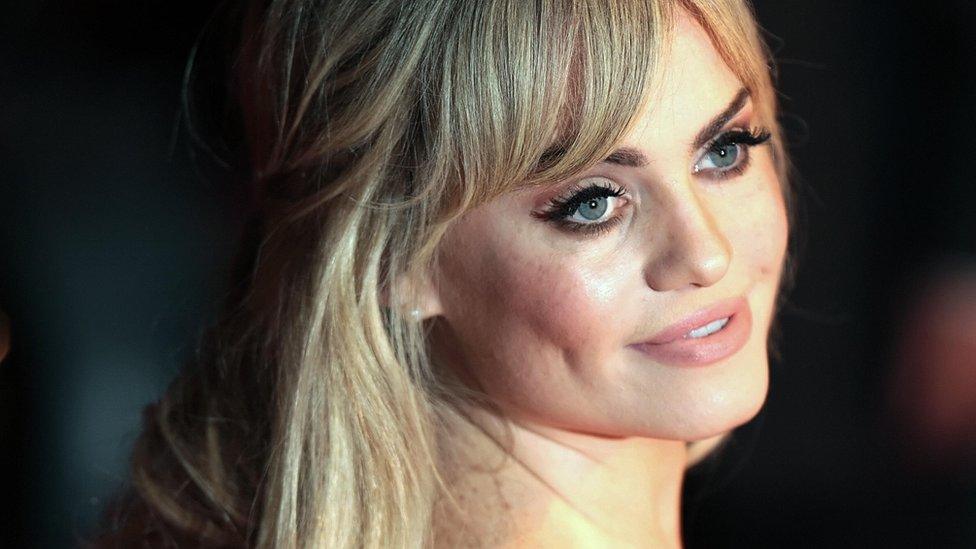Duffy: Singer criticises Netflix over 'irresponsible' kidnap film 365 Days
- Published

Duffy said she had "to witness these tragedies, and my tragedy, eroticised and demeaned"
Singer Duffy has criticised Netflix for streaming the film 365 Days, saying it glamorises "the brutal reality of sex trafficking, kidnapping and rape".
The film follows a young Polish woman who is imprisoned by a Sicilian man.
"This should not be anyone's idea of entertainment, nor should it be described as such," said Duffy, who recently revealed she was held captive and raped a decade ago.
Netflix said it would not remove the film, which it said carried warnings.
Adapted from a novel by Polish writer Blanka Lipińska, 365 Days was not produced by Netflix, but was picked up by the streaming service in June after a theatrical run in the UK and Poland in February.
Billed as an "erotic drama", it has quickly become one of the platform's most popular films.
The Guardian recently described it as "the Netflix softcore porn film that people can't stop watching", external, and The Atlantic said it was "Netflix's first summer hit", external.
Variety magazine, however, called it "thoroughly terrible, external" and "politically objectionable".
In a letter to Netflix chief executive, Reed Hastings, Duffy wrote: "It grieves me that Netflix provides a platform for such 'cinema', that eroticises kidnapping and distorts sexual violence and trafficking as a 'sexy' movie.

Italian actor Michele Morrone is the star of 365 Days
"I just can't imagine how Netflix could overlook how careless, insensitive, and dangerous this is. It has even prompted some young women, recently, to jovially ask Michele Morrone, the lead actor in the film, to kidnap them.
"We all know Netflix would not host material glamorising paedophilia, racism, homophobia, genocide, or any other crimes against humanity. The world would rightly rise up and scream.
"Tragically, victims of trafficking and kidnapping are unseen, and yet in 365 Days their suffering is made into a 'erotic drama', as described by Netflix."
'Choice and control'
Her comments came after a petition was set up on Change.org, external, calling for the movie to be removed from Netflix for "perpetuating the glamorisation of rape culture".
However, production has already begun on a sequel, actor Michele Morrone confirmed earlier this week.
Netflix did not comment on Duffy's criticisms, but told the Reuters news agency the film carried warnings for violence, sex and nudity.
"We believe strongly in giving our members around the world more choice and control over their Netflix viewing experience," a spokesman said.
No 'glossy fantasy'
In February, Duffy re-emerged after a decade out of the spotlight to reveal she had been "raped and drugged and held captive over some days" in the past.
She gave more details of her ordeal in April, saying she had been drugged in her own home for four weeks and taken to a foreign country.
"I was lucky to come away with my life, but far too many have not been so lucky," she wrote in the letter to Netflix. "And now I have to witness these tragedies, and my tragedy, eroticised and demeaned."
She also addressed viewers directly: "I encourage the millions who have enjoyed the movie to reflect on the reality of kidnapping and trafficking, of force and sexual exploitation, and of an experience that is the polar opposite of the glossy fantasy depicted in 365 Days."
She said 25 million people were currently trafficked around the world, a figure also quoted in the US Department of State's latest Trafficking In Persons report, external, published last month.
Last month, Duffy released a new song, River in the Sky, which was described by The Times, external as "a dignified, low-key return for an important, undervalued British singer".

Follow us on Facebook, external, or on Twitter @BBCNewsEnts, external. If you have a story suggestion email entertainment.news@bbc.co.uk, external.
- Published7 April 2020

- Published19 March 2020

- Published26 February 2020
